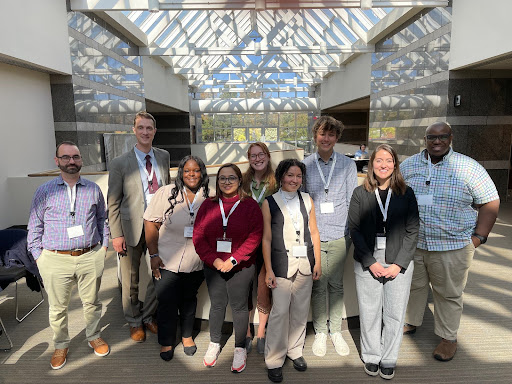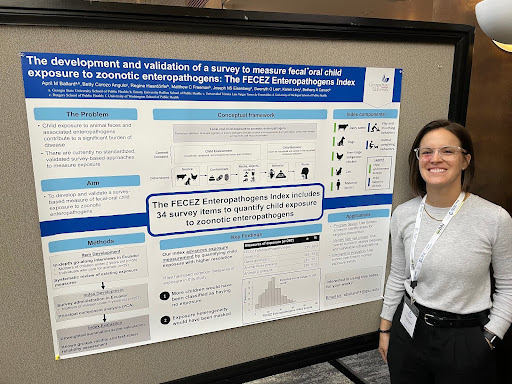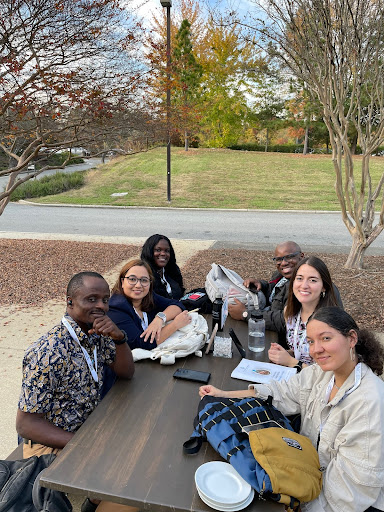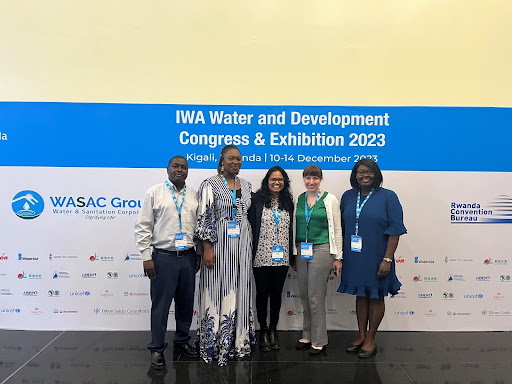Bringing New Voices into the WASH Sector: USAID scholarship expands diversity, equity, and inclusion at water sector conferences
The annual University of North Carolina (UNC) Water and Health Conference and the bi-annual International Water Association (IWA) Water and Development Congress & Exhibition bring together hundreds of WASH professionals to share research, implementation experience, and build their networks. Cross-sectoral conversations, connections, and foundations for future collaboration take place every year at these events. To make sector conferences more accessible and support broader representation, USAID announced a Water Sector Conference Participation Support Scholarship for students and faculty at US-based Minority Serving Institutions (MSIs). Following a competitive application process, eight students and one professor (representing seven MSIs) received scholarships to attend the 2023 UNC Water and Health Conference, and two students and one professor (representing three MSIs) were selected to attend the IWA Water and Development Congress.

Photo credit: Jess Melton, USAID/URBAN WASH
The annual University of North Carolina (UNC) Water and Health Conference and the bi-annual International Water Association (IWA) Water and Development Congress & Exhibition bring together hundreds of WASH professionals to share research, implementation experience, and build their networks. Cross-sectoral conversations, connections, and foundations for future collaboration take place every year at these events. To make sector conferences more accessible and support broader representation, USAID announced a Water Sector Conference Participation Support Scholarship for students and faculty at US-based Minority Serving Institutions (MSIs). Following a competitive application process, eight students and one professor (representing seven MSIs) received scholarships to attend the 2023 UNC Water and Health Conference, and two students and one professor (representing three MSIs) were selected to attend the IWA Water and Development Congress.
The scholarship program is part of USAID’s ongoing efforts to elevate diversity, equity, inclusion, and accessibility across Global Water Strategy implementation efforts.
The scholarship recipients attended plenaries, side sessions, presentations, and technology showcases as well as formal and informal networking opportunities. Several participants at the UNC conference also had the opportunity to share their research through posters and verbal presentations.
Emerald “Emma” Dudzinski (Virginia Tech) presented findings on the implications of bottled water reliance in rural West Virginia, and Andrea Navaro-Soledad (University of California at Berkeley) presented a poster on rapid and low-cost removal of hexavalent chromium from California groundwater. Professor April Ballard (Georgia State University) shared a poster on the development of a new quantitative index to measure fecal oral child exposure to zoonotic enteropathogens. She was also unexpectedly invited to be on a panel discussion on increasing the policy, programming, and practical impacts of research during the workshop on Scientific Writing and Publishing. She said the discussion “led to a lot of really unique conversations that I think will result in future collaborations.”

Photo credit: Jess Melton, USAID/URBAN WASH
“I think one of the messages that has stuck with me the most is that in terms of water and sanitation there is no developed or developing context—we all have a lot of progress to make.”
- Josh Miller, University of North Carolina at Chapel Hill
At IWA, Sarah Traoré (University of Texas at Austin) and Bhagya Galkissa-Dewage (University of Illinois at Chicago) both served as co-chairs for technical sessions. Sarah’s session focused on policy and practice options for service delivery improvement, and Bhagya spoke about advancing fecal sludge management.
Group members left presentations with ideas for post-conference research, insights into organizing data for publication, and inspiration to continue their research. During a session on microbial risk and treatment, presenters shared findings that answered questions Tamunobelema Solomon has been facing in his research at Morgan State University, and he was able to connect with them after the session to discuss future collaboration. Leonard Kibet, who has been focused on researching water management for agriculture at Langston University, was introduced to new perspectives on delivering water and sanitation services at the IWA Congress, and now intends to join IWA as a member. Douglas Austin, who hadn’t heard of the UNC conference before applying for this scholarship, found it so valuable that he wants to encourage his lab at Delaware State University to support students to attend in future years, noting that the experience would demonstrate to students how their specific lab skills can translate into real-world impact and career opportunities.
“I would describe the conference as a space where both research and practice come together, and where you can meet professionals who have come from a background in academia and decided to pursue another road but are still doing impactful work in the field.”
- Andrea Naranjo-Soledad, University of California, at Berkeley

Photo credit: Jess Melton, USAID/URBAN WASH
Participants were able to network with WASH professionals across a broad spectrum of expertise and experience, and left the conference with resources, connections, and ideas for future collaboration as well as potential new career trajectories in hand. The conversations among research scientists, social scientists, health practitioners, water facility managers, undergraduate to PhD level students, and government staff from domestic and international contexts offered participants glimpses into how and where their skills and experience fit into the WASH sector and overlap in ways they hadn’t considered before. Andrea Naranjo-Soledad who studies the low-cost, rapid removal of hexavalent chromium from groundwater at UC Berkeley, and Rakshya Baral who studies the detection of antibiotic resistance genes in wastewater effluent at Morgan State University, discovered links between their respective research topics during their time at UNC. Emma Dudzinski learned how her academic training in logistics and distribution might be applied in the sector during a session on water filtering and marketing that focused on using business approaches.
A networking lunch at UNC offered participants the opportunity to connect directly with USAID staff from the Bureaus for Resilience and Food Security and Global Health, as well as WASH professionals from implementing partners attending the conference. Overall, many left the conference with a much broader sense of potential applications for their expertise, an understanding of the wide range of career opportunities within the WASH sector, and a desire to share what they had learned with others from their universities.

“The IWA event stood out… the conference brought together experts and leaders from many low and middle-income countries in Africa and Asia. As someone passionate about global health who works in Kenya, it gave me an opportunity to grasp the challenges other LMICs face in environmental surveillance and public health concerns related to water and sanitation. This mix of perspectives sparked lively discussions about adapting our health surveillance methods to keep pace with evolving diseases.”
- Bhagya Galkissa-Dewage, University of Illinois at Chicago
Scholarship recipients who attended IWA, felt that the event broadened their perceptions of the WASH sector. Josh Miller (University of North Carolina at Chapel Hill) who had been working internationally, became interested in the discussion of challenges to water access in the U.S., particularly in Appalachia; while Emma Dudzinski, who has been conducting research in Appalachia on the economic and health implications of reliance on bottled water, became aware of the global implications of her work. Both students left the conference with increased awareness of water as a global issue that must be addressed with urgency through multi-disciplinary approaches, which heightened their motivation to continue in this field.
“I want to be part of those people who raise their voices, take action, and also lead others so that they can be part of a healthier, safe and sustainable world.”
- Nashalie Irizarry Rodriguez, Pontifical Catholic University of Puerto Rico
Through this scholarship program, USAID’s goal is to lower barriers of entry for attendance and networking at key global water sector convenings for academics whose expertise have a valuable place in WASH programs and discourse. By opening the door to more diverse experiences and perspectives, USAID and the greater WASH sector can advance progress toward sustainable solutions and more resilient communities.
Related Links
- Activity: USAID/URBAN WASH
- What We Do: Inclusive Development

About The Author
Liz Jordan is the Chief of Party for the USAID URBAN WASH activity, a global research project which aims to produce high-quality evidence to improve access to inclusive urban and peri-urban water and sanitation services.
With contributions from Douglas Austin (Delaware State University), Prof. April Ballard (Georgia State University), Rakshya Baral (Morgan State University), Emerald Dudzinski (Virginia Tech), Bhagya Galkissa-Dewage (University of Illinois at Chicago), Prof. Leonard Kibet (Langston University), Sakiya McGhee (Delaware State University), Josh Miller (University of North Carolina at Chapel Hill), Andrea Naranjo-Soledad (University of California at Berkeley), Nashalie Irizarry Rodriguez (Pontifical Catholic University of Puerto Rico), Tamunobelema Solomon (Morgan State University), Sarah Traoré (University of Texas at Austin).


